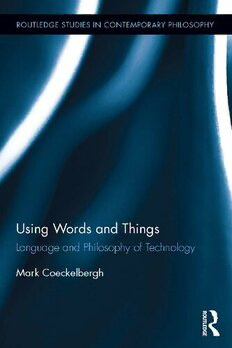Table Of ContentUsing Words and Things
This book offers a systematic framework for thinking about the relation-
ship between language and technology, and an argument for interweaving
thinking about technology with thinking about language. The main claim
of philosophy of technology—that technologies are not mere tools and arte-
facts not mere things, but crucially and significantly shape what we perceive,
do, and are—is rethought in a way that accounts for the role of language
in human technological experiences and practices. Engaging with work by
Wittgenstein, Heidegger, McLuhan, Searle, Ihde, Latour, Ricoeur, and many
others, the author critically responds to, and constructs a synthesis of, three
“extreme,” idealtype, untenable positions: (1) Only humans speak and nei-
ther language nor technologies speak, (2) Only language speaks and neither
humans nor technologies speak, and (3) Only technology speaks and neither
humans nor language speak. The construction of this synthesis goes hand
in hand with a narrative about subjects and objects that become entangled
and constitute one another. Using Words and Things thus draws in central
discussions from other subdisciplines in philosophy, such as philosophy of
language, epistemology, and metaphysics, to offer an original theory of the
relationship between language and (philosophy of) technology centered on
use, performance, and narrative, and taking a transcendental turn.
Mark Coeckelbergh is Professor of Philosophy of Media and Technology at
the Department of Philosophy, University of Vienna, and (part-time) Profes-
sor of Technology and Social Responsibility at De Montfort University, UK.
His publications include Growing Moral Relations (2012), Human Being
@ Risk (2013), Environmental Skill (2015), Money Machines (2015), New
Romantic Cyborgs (2017), and numerous articles in the area of philosophy
of technology.
Routledge Studies in Contemporary Philosophy
For a full list of titles in this series, please visit www.routledge.com
83 Time and the Philosophy of Action
Edited by Roman Altshuler and Michael J. Sigrist
84 McTaggart’s Paradox
R. D. Ingthorsson
85 Perspectives on Ignorance from Moral and Social Philosophy
Edited by Rik Peels
86 Self-Reflection for the Opaque Mind
An Essay in Neo-Sellarsian Philosophy
T. Parent
87 Facts and Values
The Ethics and Metaphysics of Normativity
Edited by Giancarlo Marchetti and Sarin Marchetti
88 Aesthetic Disinterestedness
Art, Experience, and the Self
Thomas Hilgers
89 The Social Contexts of Intellectual Virtue
Knowledge as a Team Achievement
Adam Green
90 Reflective Equilibrium and the Principles of Logical Analysis
Understanding the Laws of Logic
Jaroslav Peregrin and Vladimír Svoboda
91 Philosophical and Scientific Perspectives on Downward Causation
Edited by Michele Paolini Paoletti and Francesco Orilia
92 Using Words and Things
Language and Philosophy of Technology
Mark Coeckelbergh
Children’s Games by Pieter Bruegel the Elder, 1560. Kunsthistorisches Museum,
Vienna.
Using Words and Things
Language and Philosophy
of Technology
Mark Coeckelbergh
First published 2017
by Routledge
711 Third Avenue, New York, NY 10017
and by Routledge
2 Park Square, Milton Park, Abingdon, Oxon OX14 4RN
Routledge is an imprint of the Taylor & Francis Group, an informal
business
© 2017 Taylor & Francis
The right of Mark Coeckelbergh to be identified as author of this
work has been asserted by him in accordance with sections 77 and
78 of the Copyright, Designs and Patents Act 1988.
All rights reserved. No part of this book may be reprinted or
reproduced or utilized in any form or by any electronic, mechanical,
or other means, now known or hereafter invented, including
photocopying and recording, or in any information storage or
retrieval system, without permission in writing from the publishers.
Trademark notice: Product or corporate names may be trademarks
or registered trademarks, and are used only for identification and
explanation without intent to infringe.
Library of Congress Cataloging-in-Publication Data
A catalog record for this book has been requested
ISBN: 978-1-138-69416-3 (hbk)
ISBN: 978-1-315-52857-1 (ebk)
Typeset in Sabon
by Apex CoVantage, LLC
Contents
Acknowledgments ix
1 Introduction: Words and Things 1
PART I
Humans Speak (Subjects versus Objects) 21
2 Speaking with and about Technology 23
3 Giving Meaning to Technology: A Searlean Social
Ontology of Technological Artefacts 50
PART II
Language Speaks (Subjects Change Objects) 81
4 Language and the Social Construction of Artefacts 83
5 All about Language: Postmodern Interpretations,
or the Muting of Humans and Technology 106
PART III
Technology Speaks (Objects Change Subjects) 139
6 What Technology Tells Us (to Do) (Part 1): Media,
Artefacts, Networks 141
7 What Technology Tells Us (to Do) (Part 2): Narrative
Technologies, or Interpreting and Materializing Ricoeur 211
viii Contents
PART IV
Humans, Language, and Technology Speak
(Subjects and Objects Entangled) 251
8 Using and Performing with Words and Things 253
Index 289
Acknowledgments
Many thanks to Andrew Weckenmann, Allie Simmons, and their colleagues
from Routledge for supporting and working on this book project. I warmly
thank Michael Funk, Stefan Koller, Wessel Reijers, Peter Rantasa, Martin
Kusch, and Hans Bernhard Schmid for our discussions about topics relevant
to this book, including Wittgenstein, use, performance, Searle, collective
intentionality, Ricoeur, narrative, and voice. I am also very grateful to Yoni
Van Den Eede and Martin Kusch for reading and commenting on an earlier
draft of this manuscript, to the anonymous reviewers for reading and appre-
ciating my initial book proposal, and to Agnes Buchberger for her assistance
with formatting and correcting the final version of the manuscript. Finally,
with this essay on language and technology I wish to honor Carl Mitcham,
Don Ihde, Langdon Winner, and other “first generation” contemporary phi-
losophers of technology, without whom this field would not exist in its pres-
ent form, and to whose pioneering work this book can read as a respectful
footnote.

